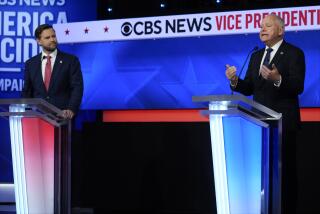Sharp Discord in Debate on Remedies for Social Ills : Democratic Hopefuls Clash on Economy
- Share via
NEW ORLEANS — Rep. Richard A. Gephardt and his Democratic presidential rival Massachusetts Gov. Michael S. Dukakis derided each other’s remedies for the nation’s economic and social ills Monday night in a debate involving all six contenders for the 1988 Democratic nomination.
Gephardt called Dukakis’ proposal to raise substantial revenue by increasing compliance with the federal income tax “hokum, when it comes to dealing with the budget.” Dukakis had said his approach would boost revenues by about $35 billion a year, but the Missouri congressman said no more than $2 billion could be raised that way.
Earlier, Dukakis had been equally critical of a Gephardt proposal to extend health insurance to those of the “working poor” not currently covered through the use of tax credits.
‘Don’t Have Money to Eat’
“These folks don’t have money to eat . . . let alone go out and buy health insurance and get a tax credit for it,” Dukakis said.
As a better approach, he cited legislation that he is backing in Massachusetts requiring nearly all employers to provide health insurance for their workers.
The exchanges between these two, regarded by many as the leading contenders for the nomination, were the liveliest moments of a 90-minute encounter between the Democratic candidates that was broadcast by public television in several Southern states and elsewhere, including New York, San Francisco, Boston and Milwaukee.
This confrontation was sponsored by the Democratic Leadership Council, a group of moderate to conservative Democratic office holders. It was ostensibly devoted to dealing with poverty and other social programs. However, the candidates, mindful of the financial crisis of the past fortnight, often wandered afield to talk about more fundamental economic issues.
In confronting the problem of poverty in general, the Democratic contenders somewhat resembled the blind men who, when asked to identify an elephant, each came up with a different answer after poking and probing at a different part of the beast’s anatomy.
Each Offers Solutions
For their part, the Democratic candidates each offered one or two solutions to poverty shaped by their particular backgrounds and by proposals that they have made the mainstays of their candidacies.
Illinois Sen. Paul Simon, for example, who styles himself as more of a “traditional Democrat” than any of his rivals, stressed the need for a jobs program.
“You have to have a jobs program, otherwise you are not going to be lifting them (the underclass). And you have to combine that with an intensive education program,” he said.
As for the Rev. Jesse Jackson--who got off what was probably the best riposte of the night when he claimed to be better equipped than the others to deal with the subject because “I have been the poorest the longest and the most recently”--he contended that the Democrats must attack “the myths of Reaganomics,” particularly excessive spending on defense. He charged that President Reagan was “obsessed” with what Jackson called “military overruns”--which he defined as unnecessary spending on weaponry.
Former Arizona Gov. Bruce Babbitt kept bringing the discussion back to the federal budget deficit, now $150 billion and expected to increase.
‘It’s All Words’
“How are you going to pay for it?” he asked his rivals, who had proposed remedies for social problems. “It’s all words,” he contended, unless action was taken to reduce the deficit. Babbitt has proposed doing this through means testing for entitlement programs--reducing benefits for the affluent--to cut spending and through what he calls a progressive consumption tax to raise revenues.
Tennessee Sen. Albert Gore Jr. placed most of his emphasis on education, from programs such as Head Start for preschool children to job training for adults.
Gore also referred frequently to the need for what he called a “social compact,” which involved some obligation for beneficiaries of social programs. “When you give benefits, we should expect something in return,” Gore said. He suggested that beneficiaries who were illiterate should “learn to read and write or enroll in a literacy program” to help them improve their chances of employment.
Gephardt continued to emphasize his tough stance on trade, which has been the hallmark of his candidacy. Noting charges of protectionism against him, Gephardt declared defiantly: “If standing up for American workers and insisting on prying open foreign markets is protectionism, then I want to be a protectionist.”
Dukakis Cites His Success
Dukakis, in this forum, as in previous debates, stressed his success in Massachusetts with welfare reform, relying on job training and day care centers to help welfare mothers return to the work force, along with his tax amnesty and compliance proposal.
The New Orleans debate is the second in a series of such encounters in Southern cities that have a twofold objective.
One aim is to use the debates to heighten interest in the so-called Super Tuesday primary next March 8 when 13 Southern and border states will select their delegates to the national Democratic Convention. Democratic leaders hope that a large primary turnout will be more representative of the overall electorate that goes to the polls in November, 1988, and increase the chances of a moderate candidate.
The other aim of the debates--which began last month with a session in Miami on defense policy--is to create a more favorable perception of the national Democratic Party in the South.
Monday’s debate on social policy was intended to give the presidential candidates a chance to make their party’s traditional concern with the underprivileged and the downtrodden more acceptable to white middle-class Southerners.
Political writer Keith Love contributed to this story.
More to Read
Get the L.A. Times Politics newsletter
Deeply reported insights into legislation, politics and policy from Sacramento, Washington and beyond. In your inbox three times per week.
You may occasionally receive promotional content from the Los Angeles Times.










